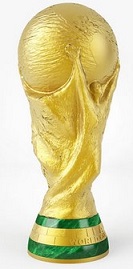 It’s official! Portugal will host matches at the biggest sporting event in the world. The 2030 FIFA World Cup will be organised jointly by Portugal, Spain and Morocco, in addition to the first three games taking place in South America.
It’s official! Portugal will host matches at the biggest sporting event in the world. The 2030 FIFA World Cup will be organised jointly by Portugal, Spain and Morocco, in addition to the first three games taking place in South America.
The full details are yet to be disclosed, but Portugal, Spain and Morocco will stage 101 matches in the 48-team tournament, although the competition will kick off in Uruguay, Argentina and Paraguay.
FIFA head Gianni Infantino today announced the unprecedented format that sees the World Cup played in six different countries and three different continents.
”In a divided world, FIFA and football are uniting,” said Infantino, explaining that the first three matches will be played in Uruguay, Argentina and Paraguay to celebrate the centenary of the first World Cup that was played in Uruguay in 1930.
“The FIFA Council also agreed unanimously that the only bid to host the FIFA World Cup 2030 will be the joint bid of Morocco, Portugal and Spain. Two continents - Africa and Europe - united not only in a celebration of football but also in providing unique social and cultural cohesion. What a great message of peace, tolerance and inclusion.
“In 2030, we will have a unique global footprint, three continents and six countries welcoming and uniting the world while celebrating together the beautiful game, the centenary and the FIFA World Cup.”
Juntos vamos construir o melhor mundial de sempre! ?? Espanha, Marrocos e Portugal vão ser os anfitriões da maior competição desportiva do Mundo! ?
— Portugal (@selecaoportugal) October 4, 2023
Together we'll make the best World Cup ever! ?? Spain, Morocco and Portugal will be the hosts of the biggest sporting competition… pic.twitter.com/MOmK7OpmtB
The president of the Portuguese Football Federation Fernando Gomes has no doubt that the tournament will leave a lasting impression on the game.
”This decision brings to the three host countries an exhilarating tradition, an unparalleled organisational experience and the chance to innovate that will certainly leave a mark on the future of the competition.”
By Tom Kundert

